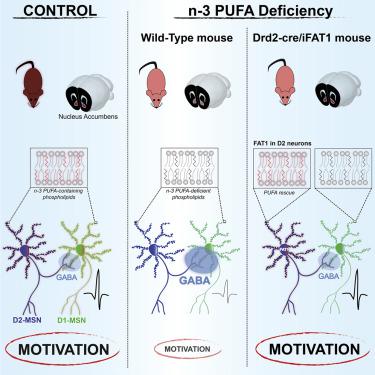Cell Metabolism ( IF 27.7 ) Pub Date : 2020-03-05 , DOI: 10.1016/j.cmet.2020.02.012 Fabien Ducrocq 1 , Roman Walle 1 , Andrea Contini 1 , Asma Oummadi 1 , Baptiste Caraballo 1 , Suzanne van der Veldt 1 , Marie-Lou Boyer 1 , Frank Aby 1 , Tarson Tolentino-Cortez 2 , Jean-Christophe Helbling 1 , Lucy Martine 3 , Stéphane Grégoire 3 , Stéphanie Cabaret 3 , Sylvie Vancassel 1 , Sophie Layé 1 , Jing Xuan Kang 4 , Xavier Fioramonti 1 , Olivier Berdeaux 3 , Gabriel Barreda-Gómez 2 , Elodie Masson 3 , Guillaume Ferreira 1 , David W L Ma 5 , Clementine Bosch-Bouju 1 , Véronique De Smedt-Peyrusse 1 , Pierre Trifilieff 1

|
Reward-processing impairment is a common symptomatic dimension of several psychiatric disorders. However, whether the underlying pathological mechanisms are common is unknown. Herein, we asked if the decrease in the n-3 polyunsaturated fatty acid (PUFA) lipid species, consistently described in these pathologies, could underlie reward-processing deficits. We show that reduced n-3 PUFA biostatus in mice leads to selective motivational impairments. Electrophysiological recordings revealed increased collateral inhibition of dopamine D2 receptor-expressing medium spiny neurons (D2-MSNs) onto dopamine D1 receptor-expressing MSNs in the nucleus accumbens, a main brain region for the modulation of motivation. Strikingly, transgenically preventing n-3 PUFA deficiency selectively in D2-expressing neurons normalizes MSN collateral inhibition and enhances motivation. These results constitute the first demonstration of a causal link between a behavioral deficit and n-3 PUFA decrease in a discrete neuronal population and suggest that lower n-3 PUFA biostatus in psychopathologies could participate in the etiology of reward-related symptoms.
中文翻译:

n-3 多不饱和脂肪酸缺乏与动机缺乏之间的因果关系
奖励加工障碍是几种精神疾病的常见症状维度。然而,潜在的病理机制是否普遍尚不清楚。在此,我们询问了在这些病理中一致描述的 n-3 多不饱和脂肪酸 (PUFA) 脂质种类的减少是否会导致奖励处理缺陷。我们表明,小鼠 n-3 PUFA 生物状态降低会导致选择性动机障碍。电生理记录显示,表达多巴胺 D2 受体的中型多刺神经元 (D2-MSN) 对伏隔核中表达多巴胺 D1 受体的 MSN 的附带抑制增加,伏隔核是调节动机的主要大脑区域。引人注目的是,在表达 D2 的神经元中选择性地通过转基因预防 n-3 PUFA 缺乏使 MSN 侧支抑制正常化并增强动机。这些结果首次证明了离散神经元群体中行为缺陷与 n-3 PUFA 减少之间存在因果关系,并表明精神病理学中较低的 n-3 PUFA 生物状态可能参与奖励相关症状的病因学。











































 京公网安备 11010802027423号
京公网安备 11010802027423号